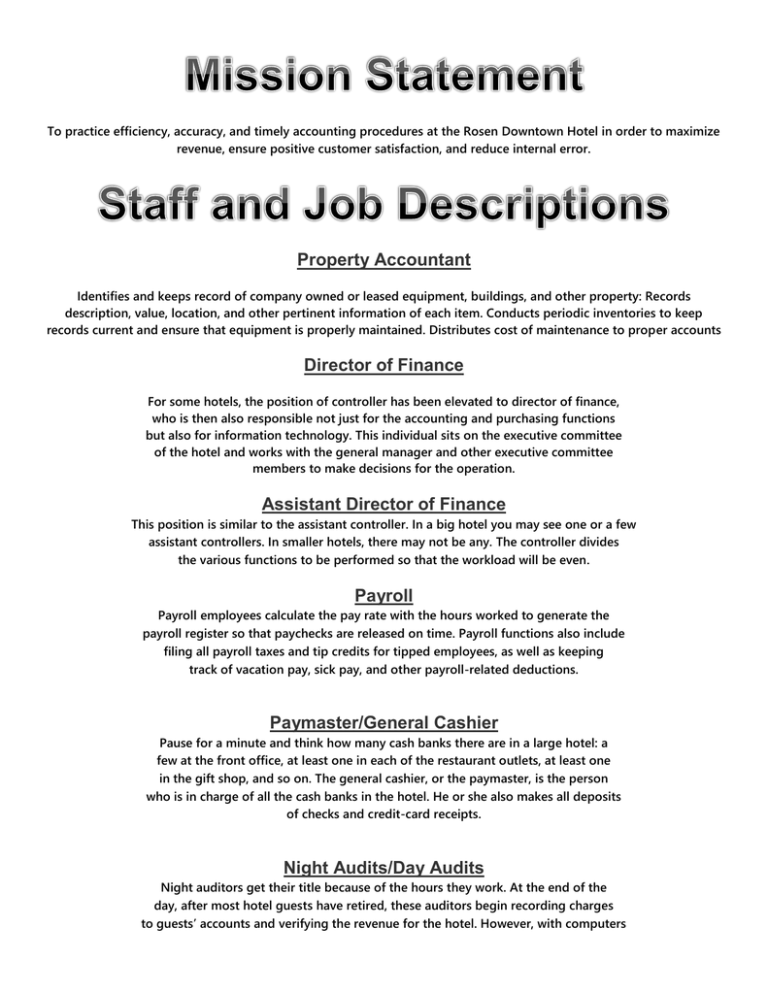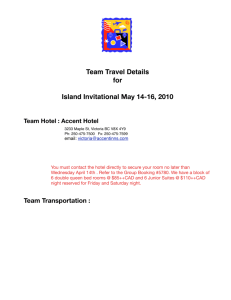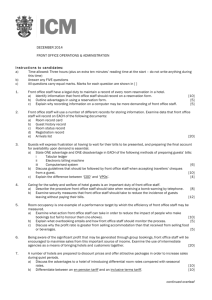Accounting Wiki
advertisement

To practice efficiency, accuracy, and timely accounting procedures at the Rosen Downtown Hotel in order to maximize revenue, ensure positive customer satisfaction, and reduce internal error. Property Accountant Identifies and keeps record of company owned or leased equipment, buildings, and other property: Records description, value, location, and other pertinent information of each item. Conducts periodic inventories to keep records current and ensure that equipment is properly maintained. Distributes cost of maintenance to proper accounts Director of Finance For some hotels, the position of controller has been elevated to director of finance, who is then also responsible not just for the accounting and purchasing functions but also for information technology. This individual sits on the executive committee of the hotel and works with the general manager and other executive committee members to make decisions for the operation. Assistant Director of Finance This position is similar to the assistant controller. In a big hotel you may see one or a few assistant controllers. In smaller hotels, there may not be any. The controller divides the various functions to be performed so that the workload will be even. Payroll Payroll employees calculate the pay rate with the hours worked to generate the payroll register so that paychecks are released on time. Payroll functions also include filing all payroll taxes and tip credits for tipped employees, as well as keeping track of vacation pay, sick pay, and other payroll-related deductions. Paymaster/General Cashier Pause for a minute and think how many cash banks there are in a large hotel: a few at the front office, at least one in each of the restaurant outlets, at least one in the gift shop, and so on. The general cashier, or the paymaster, is the person who is in charge of all the cash banks in the hotel. He or she also makes all deposits of checks and credit-card receipts. Night Audits/Day Audits Night auditors get their title because of the hours they work. At the end of the day, after most hotel guests have retired, these auditors begin recording charges to guests’ accounts and verifying the revenue for the hotel. However, with computers and various technologies, the hotel industry can post charges instantaneously. Some hotels actually have changed night auditors to day auditors. Director of Information Technology This position is still evolving in the hotel industry. While some information technology (IT) directors report to the director of finance, some report directly to the general manager. They are in charge of all the property management systems and point-of-sales systems and their integration with call accounting or any other automated systems used in the hotel. Their scope of responsibility has grown in the past decade at the property level as the use of technology has become more prevalent. Especially in the past few years, when identity theft and data theft have crippled hotels in their operations and compromised the security of guests, the responsibility and importance of the IT directors also have increased. In smaller hotels, the controller or an assistant controller may take on this responsibility . Operations Analyst This is a nice position to have in a hotel. An operations analyst performs analyses to help managers operate the hotel more effectively. From guests’ statistics to revenue trends, the operations analyst does it all. However, not all hotels are able to afford an analyst on the payroll. If this is the case, an assistant controller often performs these duties. For smaller hotels that do not have an accounting office on the property, this function is done at the district or regional level. Director of Purchasing This person is often also known as the purchaser or the purchasing agent. He or she negotiates for and buys everything the hotel needs. Although on a daily basis it appears that all a hotel needs are food and beverage items, the fact is that there are many other items that need to be purchased new or replenished and replaced, from office supplies, to kitchen equipment, to bedding, furniture, decorative art items, and many more. Receiving Clerk When any purchased items come in, they should be delivered to the back dock area where the receiving clerks can check the delivered goods against the purchasing orders to ensure that only the proper items will be received and accounted for. More details of this function will be discussed in Chapters 9 and 10. Storeroom Clerk Once any goods are received, they are delivered either to the proper departments or to the storeroom to be kept until they are requisitioned by the departments. The storeroom clerk will ensure that the stock is being rotated. This is especially crucial for food items so that current products will be consumed first, before any new products that have just arrived. Information regarding job and descriptions were referenced from the hyperlink… Inquiry request, approval or denial depending on correct budgeting and allocated resources. The purchasing procedures are as follows; First, a budget is created based on past history, as well as the forecast for the month. Once this is done, it is then turned over to the purchasing & receiving department, where they order product for the hotel. Daily purchasing reports are created and submitted back to accounting weekly, with a weekly report. Inventory is recorded bi-weekly to account for how much product is on the shelves, so it can be subtracted from overall cost, because it is product that will be used. Internal audit is done bi-annually. An outside accounting firm specializing in audits comes in and looks at the statements and conducts their own audit. They look into the reports and compare them to inventory and house records to ensure accuracy Information provided by website above:





